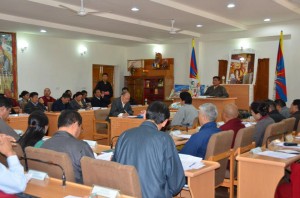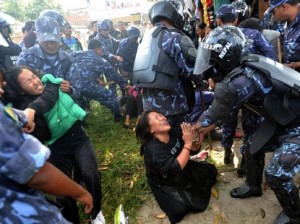On the 18th of March, the Tibetan Parliament in exile began its annual budget session in Dharamsala. Held under the shadow of increasing tensions and the ongoing self-immolations within Tibet, the parliament opened with Speaker PenpaTseringcriticising the Chinese government in its approach to Tibetan grievances. “We carry the sufferings and sacrifices of Tibetans inside Tibet in our hearts and we vow to amplify our efforts in urging the international community to take action”, Speaker Tsering said, expressing the wider Parliamentary concerns over Chinese governmental policies. The opening day concluded with Speaker Tsering echoing the calls of the wider Tibetan leadership, to resolve the crisis with opened dialogue with new Chinese leader, Xi Jimping. The 15th Tibetan parliament will work to approve a new budget during its 11 day session.
The Parliament of the Central Tibetan Administration is a democratically elected group, set to represent all areas of Tibet as well as the interests of Tibetans in exile abroad in Europe and the USA. This includes not only geographic representation, but also religious figures from all four major schools of Tibetan Buddhism and the Bon faith. In an ongoing process, the parliamentary system has aimed to “instill the seeds of self-reliance, combining democratic functioning with Tibetan values”, which is achieved through a system of representation and frequent tours of Tibetan exile settlements undertaken by Parliamentary members. Ultimately, this led to the announcement on the 10th March 2011, that His Holiness the Dalai Lama would stand down from all political responsibilities in favour of political autonomy and the devolution of “formal authority to the elected leader”.
The roles of the Parliament today are as varied as any Parliamentary system globally, and operate to represent at its most direct and intimate level, the interests of the Tibetan population in exile. The March session addressing budget allocation, is an important demonstration of this. Whilst this remains the primary focus of the Parliamentary body, Speaker PenpaTsering stressed further International outreach is necessary, in order to highlight Tibetan issues on a global platform. The representation of Tibetans within Parliament extends therefore beyond a micro level, and has aims to promote the at Tibetan cause to wide audience.
The budget session was concluded on Mar 28. The total budget of Rs1,280,329,262 is allocated between the five divisions of Parliament:
1. Administration and its related offices for the Speaker, Deputy Speaker and the Judiciary: Supreme Justice Commission: Rs 1,661,083
2. Legislature, including the MPs office, Tibetan courts and local Tibetan government administration: Rs 40, 675, 313
3. Political Activities and other related offices including new political activities, and inlcuding Secretariat, security department, international relations and the Representative Offices which looks after Tibetan activities worldwide: Rs 403,580,862
4.Administration and other related offices including the election commission, public commission, auditor general and finance department: Rs 155,451,205
5. Social Activities relating to the Tibetan people in exile including the Public Affairs Office, Religion and Cultural Affairs Department, health, eduction, the reception centres, and the Home Department which looks after the exile settlements, and the Sambhata Schools Society: Rs 601,208,999.
Funding for the above activities will be allocated from the total budget as follows: regular expenditure fund Rs 456,694,609, special fund Rs180,956,349, direct expenses fund Rs 642,678,304.
There is a further account to fund the administration for Tibetans in Southern India, and the exile communities overseas: Rs 39,775,612
There is a budget increase over the previous year (2012-13) to allow for increased spending on education and the home affairs departments.





 Print
Print Email
Email